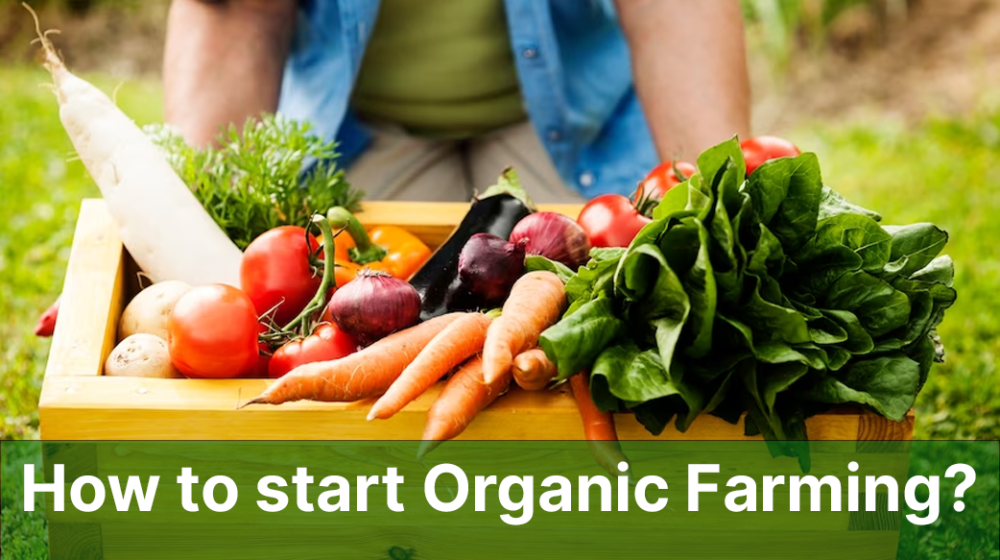How to Start Organic Farming: A Comprehensive Guide
Introduction
In today’s fast-paced world, the demand for fresh, organic produce is on the rise. People are becoming more conscious of their health and the environment, leading to an increased interest in organic farming. If you’re considering embarking on the journey of organic farming, you’re making a commendable choice that benefits both your well-being and the planet. In this comprehensive guide, we will delve into the intricacies of how to start organic farming and establish a successful, sustainable venture.
Understanding Organic Farming
What is Organic Farming?
Organic farming is a holistic approach to agriculture that focuses on cultivating crops and raising livestock in a manner that preserves the natural balance of ecosystems. Unlike conventional farming, which relies heavily on synthetic pesticides and fertilizers, organic farming prioritizes the use of natural resources, such as compost, cover crops, and beneficial insects, to promote plant health and combat pests.
Benefits of Organic Farming
The benefits of organic farming extend beyond the dinner table. Organic practices contribute to soil fertility, reduce pollution, conserve water, and support biodiversity. By eliminating the use of harmful chemicals, organic farming ensures that the produce is free from pesticide residues, making it safer for consumption.
Getting Started with Organic Farming
Step 1: Selecting the Right Location
The success of your organic farm begins with choosing the right location. Look for land with well-drained soil, good sunlight exposure, and access to a clean water source. Conduct a soil test to assess its fertility and pH levels, which will help determine the types of crops that thrive in your chosen area.
Step 2: Planning Your Crops
Diversification is key in organic farming. Plan your crop rotation strategically to prevent soil depletion and pest buildup. Research which crops are well-suited for your region and climate, and consider intercropping or companion planting to maximize space and deter pests naturally.
Step 3: Building Healthy Soil
Healthy soil is the foundation of a successful organic farm. Incorporate compost, cover crops, and organic matter to improve soil structure and nutrient content. Avoid tilling excessively, as it can disrupt the soil ecosystem. Instead, practice minimal tillage or no-till methods to maintain soil health.
Step 4: Natural Pest Management
Effective pest management is crucial in organic farming. Encourage natural predators, such as ladybugs and spiders, to control pests. Introduce trap crops and use physical barriers like row covers to prevent infestations. Utilize organic-approved pesticides sparingly and as a last resort.
Sustainable Practices in Organic Farming
Water Conservation
Conserving water is essential for sustainable organic farming. Implement efficient irrigation systems, such as drip or soaker hoses, to minimize water wastage. Collect rainwater and use mulch to retain soil moisture, reducing the need for excessive watering.
Biodiversity Enhancement
Promote biodiversity on your farm by creating habitats for beneficial insects and wildlife. Plant native flowering species to attract pollinators like bees and butterflies. Incorporate hedgerows and cover crops to provide shelter and food for animals, contributing to a balanced ecosystem.
Composting and Recycling
Organic farming is synonymous with recycling and composting. Transform kitchen scraps, plant residues, and manure into nutrient-rich compost to enrich your soil. Composting reduces waste and minimizes the need for synthetic fertilizers.
Marketing Your Organic Produce
Local Farmers’ Markets
One effective way to market your organic produce is by participating in local farmers’ markets. Connect directly with consumers, share your farming practices, and build a loyal customer base. Display your fresh, organic products proudly and educate buyers about the benefits of organic farming.
Online Presence
In today’s digital age, having an online presence is vital. Create a user-friendly website and social media profiles to showcase your farm, products, and practices. Regularly update your platforms with engaging content, such as behind-the-scenes videos, informative blog posts, and customer testimonials.
Embarking on a journey into organic farming is a noble endeavor that holds both personal and environmental rewards. By following the principles outlined in this comprehensive guide, you’ll be well-equipped to start your organic farming venture successfully. Remember, organic farming is not just a practice; it’s a commitment to nurturing the land, preserving biodiversity, and providing wholesome, pesticide-free food for generations to come.
